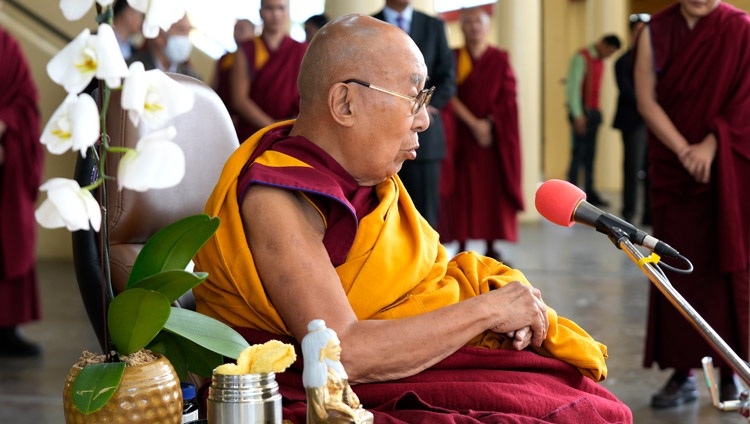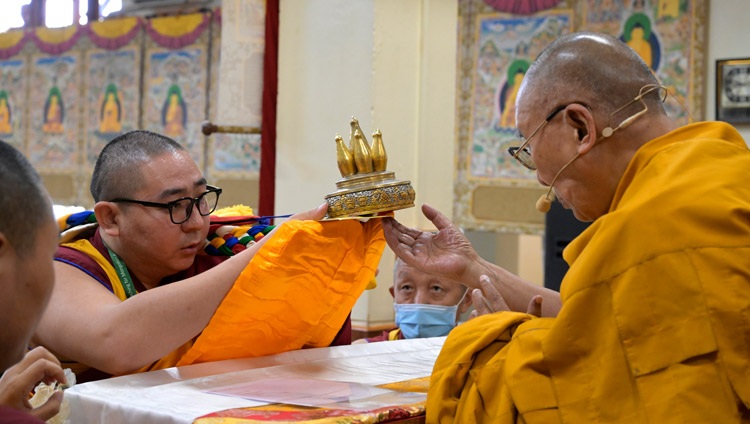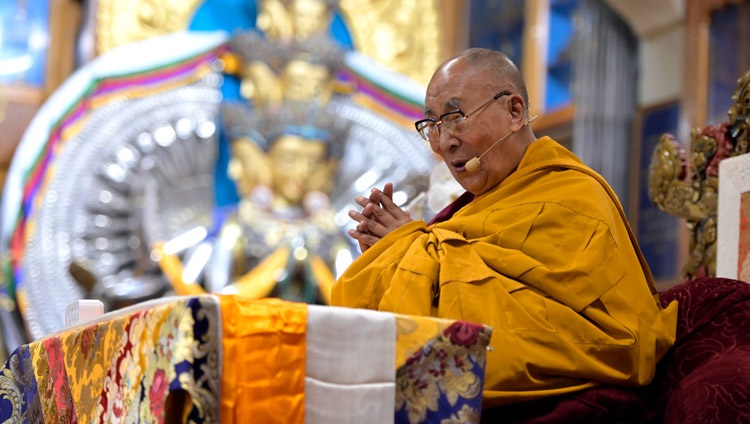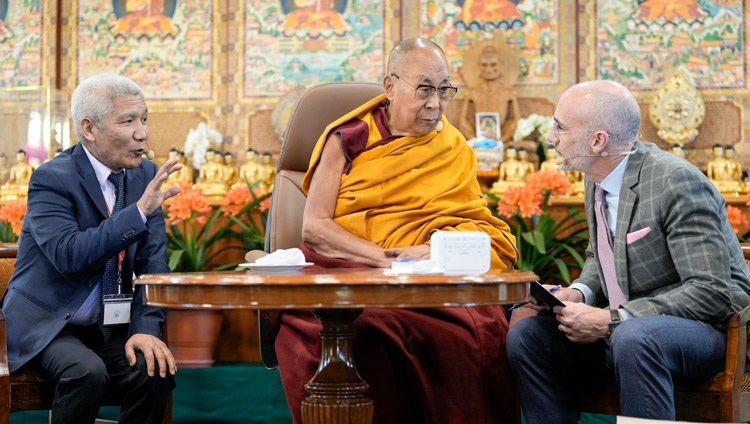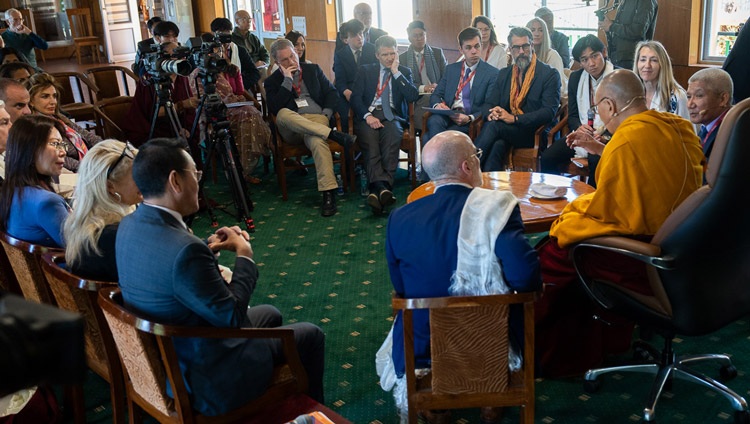Meeting with Mind & Life – Interdependence, Ethics and Social Networks – Day One
Thekchen Chöling, Dharamsala, HP, India – This morning His Holiness the Dalai Lama joined approximately 180 people in the audience hall at his residence. 101 were members or friends of the Mind & Life Institute. The remainder included Tibetan monks and nuns who have participated in the science programs at Emory University, as well as students of science from the Men-tsee-khang, the Library of Tibetan Works & Archives and so forth, as well as Lamas and Abbots from the centres of learning at the great monasteries in South India.

President of the Mind & Life Institute, Susan Bauer-Wu welcoming His Holiness the Dalai Lama at the start of the first day of the Meeting with Mind & Life at his residence in Dharamsala, HP, India on October 12, 2022. Photo by Tenzin Choejor
President of the Mind & Life Institute, Susan Bauer-Wu welcomed His Holiness.
“We, your friends at Mind & Life, are happy to be here,” she said. “It’s been 3 years since we saw you in person, and it’s so good to see you looking so well. This event comes about as a result of the efforts of the Mind & Life Institute and Mind & Life Europe. It’s been 35 years since the first Mind & Life dialogue took place. We’re so happy to be back.”
“We’ve held a lot of Mind & Life dialogues,” His Holiness replied, and I feel they’ve been very important. In the world at large, a great deal of attention has been paid to physical things, but much less to the mind. And yet, when we talk about happiness and suffering, they are inner, mental experiences. If we have no peace of mind, we won’t be happy.
“Many of the conflicts we see in the world are about physical things, material resources and power. Therefore, we need to look at what went on in the past and learn from it so that we can construct a future based on peace, happiness and togetherness.
“The root of peace of mind is compassion. As soon as most of us are born our mothers take care of us and give us our first lessons in compassion. Without this we would not survive. This is how our life begins. As children we grow up in an atmosphere of compassion. We unhesitatingly play with our neighbours’ children. When I was small, I played with Muslim and Chinese children from nearby without giving it another thought. We all smiled and readily played together. The key factor to such good relations is warm-heartedness.
“It seems to me we neglect something in our education. Experience shows us that the more compassionate we are, the more we achieve inner peace and with it inner strength. Although in our lives we depend on so many other people, there’s little place for such human values in modern education.”
Invited to say a few opening words Richie Davidson declared, “How good it is to be among new friends and old friends. Our presenters include an anthropologist, a psychologist, a philosopher of mind and cognitive science and a cognitive scientist researching human behaviour, social systems and so forth.

Richie Davidson delivering his opening remarks on the first day of the Meeting with Mind & Life at His Holiness the Dalai Lama’s residence in Dharamsala, HP, India on October 12, 2022. Photo by Tenzin Choejor
“We’ve lately seen various changes in the world that include climate change and an increase in depression. Since the pandemic it has become clear that loneliness is a greater threat to health than obesity. We need to give greater acknowledgement to our interconnectedness. We want to explore what it means to be a social animal, how we can overcome polarization, which poses such a threat to democracy. We want to investigate the pitfalls of interconnectedness in relation to AI (artificial intelligence). We want to make this world a better, kinder place.
“I speak on behalf of all my colleagues here in thanking you, Your Holiness, for your dedication to meeting us scientists and scholars over the last 35 years. Our meetings have had great impact. Please live long and in good health.”
“Peace of mind is important, even if only for its contribution to good health,” His Holiness replied. “It brings self-confidence and freedom from fear. Perhaps brain specialists can shed some light on this. I understand that good sleep and dreams can affect the brain positively and peace of mind facilitates this.
“I’ve faced turbulence in my life, but I have also studied psychology as presented in the Nalanda Tradition and found it very helpful.”
Moderator Roshi Joan Halifax introduced the first presenter, Joseph Henrich, an anthropologist at Harvard who combines many disciplines in his expertise. He has looked into how genetics and culture shape our minds.
“My research looks into what makes us human,” Henrich began. “We human beings have spread across the world over 100,000 years. Why is our species so dominant? Often research indicates factors like language, the use of tools and social cooperation have made human beings what they are. Our culture is cumulative. We learn, modify, hone and refine what is eventually passed down.

Moderator Roshi Joan Halifax looks on as the first presenter, Joseph Henrich, an anthropologist from Harvard delivers his presentation on the first day of the Meeting with Mind & Life at His Holiness the Dalai Lama’s residence in Dharamsala, HP, India on October 12, 2022. Photo by Tenzin Choejor
“Culture has shaped our genetic dispositions and our nature. Our way of thinking has shaped our body and mind. For example, we human beings learned to make fire and cook, which changed our physiology. As we learn from others, changes become wired into social norms and aspects of language.”
“I believe,” His Holiness interjected, “that what’s important is the idea of the oneness of all human beings. In pursuing old ways of thinking we have engaged in too much violence and war, whereas now we have to learn to live together.”
“The question is, how can we build a greater sense of oneness,” Henrich continued. “We find we make rules, we develop an interdependent psychology that can be expressed as food sharing. The survival of others affects our own survival. When we study other societies, we come across common eating practices.
“Ethnic psychology suggests there has been cultural evolution. We share faculties with others like us. We need to examine how to build a global psychology. Agriculture led to conflict. We can learn from how cultural change has been used and build a global identity that also accommodates local groups. Insight into human nature can help us address the challenges we face.”
Roshi Joan Halifax asked Henrich to swap seats with the next presenter, Molly Crockett, who she described as a different kind of scientist. She has brought many different factors together to contribute to understanding human nature.
His Holiness remarked, “Now we have to think about the future without copying the past. We have to take a broader perspective, not only concerning ourselves with my nation, my community and so on. We have to think about the whole of humanity; the oneness of all human beings. “

His Holiness the Dalai Lama addressing the gathering on the first day of the Meeting with Mind & Life at his residence in Dharamsala, HP, India on October 12, 2022. Photo by Tenzin Choejor
Molly Crocket opened her presentation saying, “I’ve agreed with everything you’ve said so far. Modern science is largely in agreement with you that we are essentially the same. However, there are also many people who believe human beings are basically selfish and divided from one another.
“The idea that human beings are selfish has influenced policy, as we saw in the pandemic. But these observations are not definitive or complete because we also know that helping others makes us happy. When we do this, similar parts of the brain are stimulated as when we enjoy good food or gaze on a beautiful sunset. Selfishness is an obstacle to working together.
“We need to focus on how connected we are. We need to tell a more positive story.”
“We all want to live a happy life,” His Holiness added, “and we all have a right to do so. This is common sense, and we don’t need weapons to do so.”
“Part of the problem between Russia and Ukraine,” Crocket went on, “is to do with the hateful stories between them. Things don’t have to be this way. It’s possible to make an effort to tell more positive stories. It’s been observed that when people come together, for example to attend a Kalachakra empowerment or another kind of festival there are changes in how people see themselves.”
His Holiness observed that his life is dedicated to achieving genuine world peace.
“Earlier you were talking about secular education,” Crocket commented, “our research shows that when people come together and spend time with each other in a positive context, they feel more connected.”

Molly Crocket delivering her presentation on the first day of the Meeting with Mind & Life at His Holiness the Dalai Lama’s residence in Dharamsala, HP, India on October 12, 2022. Photo by Tenzin Choejor
Responding to a question about leadership, His Holiness suggested that in democratic countries leaders emerge from amongst the general public. He added that what we need are leaders who promote warm-heartedness.
There are also leaders more interested in exercising power, but His Holiness laughed and pointed out that their power was ineffective when it came to reducing global warming and climate change.
Molly Crocket observed that leaders can help us all get along better together. She asked how it is that when having a sense of oneness and connectedness clearly makes a difference, so many think selfishness is a reality.
“It’s to do with drawbacks in our education and our tendency towards thinking in materialistic terms,” His Holiness responded. “We must train students to see warm-heartedness as positive and of benefit. This is the real key to happiness and inner strength.”
Joe Henrich acknowledged the oneness of humanity, but observed that we also need local connections. He asked how the tension between local and global communities can be reconciled.
“We belong to different nations, speak different languages and have different ways of thinking, but we can always recognise that at the same time what unites us is that we are human beings,” His Holiness replied. “Centuries ago, Tibetans translated Buddhist literature into Tibetan from Pali and Sanskrit. The language changed but the content remained the same.”

His Holiness the Dalai Lama responding to questions from the presenters on the first day of the Meeting with Mind & Life at his residence in Dharamsala, HP, India on October 12, 2022. Photo by Tenzin Choejor
Molly Crocket asked about the anger people feel about the injustice of the war between Russia and Ukraine. She admitted that anger may be disturbing, but suggested that sometimes anger can bring change. His Holiness agreed that there are times when apparently harsh words or stern action are justified because they are ultimately well-motivated. He cited the forbidding expression on his tutor’s face when he was a boy as an example.
Henrich noted that the world has become more interdependent in the last 50 years, to which His Holiness agreed. He remarked that there has been a growing trend towards a more democratic approach. The public command wider respect and its views carry more weight. However, the public also need to remind themselves to take account of the whole of humanity.
“There is an urgent need,” he said, “to seek non-military solutions, to solve problems through discussion. This is the new situation today. We have to live together with no division into ‘us’ and ‘them’.”
The moderator invited John Dunne to summarize the session. He posed a question as to what we can teach that will promote a more global culture. He answered it with a verse from Shantideva’s ‘Entering the Way of a Bodhisattva’:
All those who suffer in the world do so because of their desire for their own happiness. All those happy in the world are so because of their desire for the happiness of others. 8/129

John Dunne summarizing the session on the first day of the Meeting with Mind & Life at His Holiness the Dalai Lama’s residence in Dharamsala, HP, India on October 12, 2022. Photo by Tenzin Choejor
His Holiness agreed and added the following verse from the same book:
Why say more? Observe this distinction: between the fool who longs for his own advantage and the sage who acts for the advantage of others. 8/130
He mentioned other powerful verses from Chandrakirti’s ‘Entering into the Middle Way’ that state clearly that the practice of compassion and the wisdom understanding emptiness function like the wings of a great bird that soars to the enlightened state of mind.
Invited to conclude the session Richie Davidson thanked His Holiness for the opportunities the morning had provided.
“I’ve heard you tell large group of Tibetans,” he went on, “that rituals and prayers are not enough. We have to train our minds. Every human being has the capacity and the right to achieve happiness. What can we do to help the average person to train their minds? In the past, few people brushed their teeth, now almost everyone does. Is there some similarly simple, straightforward practice we could all adopt?”
His Holiness’s answer was short and to the point.
“We have to let people know that warm-heartedness is the source of peace of mind, of inner peace, inner strength and self-confidence. I rely on your efforts to share this with others.”

